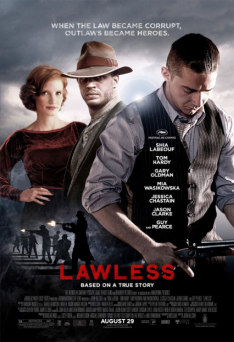By Michael Scoular (The Cascade) – Email
Print Edition: September 12, 2012
 The historical calling card of “The Great Man” predominates in Lawless, a film that springs from the tradition of men writing about men doing great things while dreaming of being inserted into the pantheon of men doing great things recorded by men. It is filmed with neither curiosity nor intrigue by John Hillcoat, best-known for his post-millennial works inspired by the writing of Cormac McCarthy.
The historical calling card of “The Great Man” predominates in Lawless, a film that springs from the tradition of men writing about men doing great things while dreaming of being inserted into the pantheon of men doing great things recorded by men. It is filmed with neither curiosity nor intrigue by John Hillcoat, best-known for his post-millennial works inspired by the writing of Cormac McCarthy.
From the outset, the claim is to veracity: “Based on a true story” emblazoned across the screen, date posts triumphantly placing this in that time when men could be men, the prime cases here being the brothers Bondurant: Forrest (Tom Hardy), Howard (Jason Clarke) and Jack (Shia LeBoeuf). Their private business of distillery and malice thrives on bribes and knuckles, at least until adversary deity (Guy Pearce) tries to knock them off their perch. But his determined outward appearance (hair slicked and suit cut) and delivery (highstrung mannerisms and effeminate laugh) all glare as neon signs. How he matches up, how his manhood compares to the Bondurants, is never left to interpretation.
Deviation from a source is never reason alone to disregard a creative work, but Hillcoat has never been able to incorporate the vast swaths of racial, gender and moral politics that have defined McCarthy’s depiction of violence and reborn myth. Here the supposed authenticity of what we are seeing is the premise of almost all of what Lawless shows, yet race, class and occupational division appear as highway signposts, not worthy of much mention, but included all the same to lend some illusory import.
Back to the gun battles at home, slightly unmoored, Hillcoat’s camera locks on tough faces and period details with musty disinterest. The impression conveyed is that this is gray and real and hard, and not the gray of black-and-white gangster pictures; these drinkers of earth-derived moonshine and speakers of broken language are not the hicks of the prohibition or depression-set images in your mind, which just isn’t as in tune with reality as Hillcoat’s picture of history.
The truths of Lawless want to stand as incorruptible: these are the facts, the things that happened, reported from a reliable source (the book the movie is based on was written by the main character’s grandson/nephew), as if Hillcoat or script writer Nick Cave are not responsible for these images, the turning of the globe – the actuality of experience is. But even if one were to put aside the perceptual skewing that relying on a self-aggrandizing account as history causes, just about every frame of this movie sets up a standard of transcendent greatness: stitches and bruises as badges of honour, powerful weapons as extensions of inherent strength. One of Tom Hardy’s speeches revolves around the definition of men as “we,” definable, exact, on a path where the ideal terminus is unquestionably the ending of this movie.
Of all the disingenuous moments, the narration of Shia LeBeouf’s character that opens the film is chief. For it to have any purpose and reason for existence, it presupposes an audience ignorant of any of the details of the American prohibition, which is, in addition to being a reasonably well-known part of recent history, a crucial part of traditional American filmmaking. Even among recent efforts in that terrain, examples like Linklater’s The Newton Boys, where his fascination and playing with truth and fiction, as in his more cited films, is on full display, or Michael Mann’s Public Enemies, grounded in digital invention and inquiry, a mode Hillcoat will likely never appear near, put Lawless to shame. If LeBoeuf’s ignorance is precisely the point, the reappearance of the same tone at the movie’s conclusion and the turns his character take along the way, make the possibility of that perspective remote. For unlike the worlds of McCarthy, death is not what a weak character like LeBoeuf will inevitably meet, or needs, but masculinization. The apparent factual basis of the events of this picture do not mean their depiction is worthy. As the other figures caught in that inevitability (Jessica Chastain, Mia Wasikowska) prove, whatever happened during the prohibition era, whatever gun pleasure, alcohol dreams, or hardscrabble ways defined, in a real way, life in that period, Lawless is still a particular kind of fantasy.


